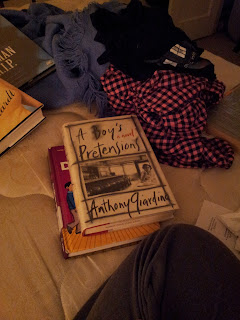Book: A History of Ancient Egypt: From the First Farmers to
the Great Pyramid
Author: John Romer
Published: 2013 (Penguin)
Pages: 395 (not counting end notes)
Not going to lie here, y’all – you need to be already
interested in ancient Egypt before you start this book. Otherwise it’ll be hard
going. There’s a lot of pottery to sift through.
But that’s the good part; Romer is excellent at talking
about what those pottery shards mean and how they, along with other stuff that
you might recognize from conventional Egyptology tropes, piece together a very
faint picture of an empire everybody thought they knew.
This ain’t your grandma’s ancient Egypt, though. He dissects
the modern, Western lens through which we’ve all been trained to look at the
pyramids and archaeological finds and basically says that, look, we really have
no idea what these mean, and what we’ve been using as facts are actually pretty
bad guesses, so here are some better ones that come with giant caveats all
meaning DUDES, WE WEREN’T THERE.
I want Romer to do this sort of check on like all known
knowledge, just to make sure. He seems really good at it, and his writing is
academic but not overly so. And this is just the first motherfucking volume,
with another one to come, and I can only hope that he wrote all at one time and
split them up because otherwise he’s probably sweating over a laptop with a
doomsday clock ticking down on his wall right this second. I don’t wish hard
deadlines on anyone, especially dudes who look like Elaine’s dad from Seinfeld and live
in Italy (check the bio, yo).
This is a library book (picked fresh from the liberry
tree!), so it’s going back, and I don’t think I’ll put it on my to-order list.
It was good, I enjoyed reading it, but it took several breaks for lighter fair
and never really felt fun enough for a re-read. I may or may not check out
volume 2. We’ll see.
I feel like I have to put a disclaimer somewhere that I am
not actually a librarian. I work in HR at a library, which is still awesome,
and I plan on getting my MLIS eventually, and I can help you look something up
on our online catalogue but…not a librarian. I mention this because I tried to
distinguish it during a drunken discussion while watching a football game with
people on Saturday, and I fear that was the worst possible scenario to get my
point across.
But I’ll totally answer to librarian. Miss Bookstacks if
you’re nasty, heh.






